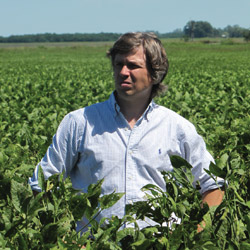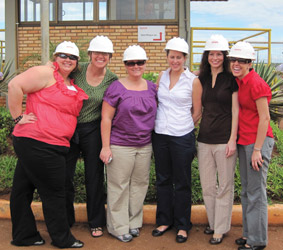A Global Perspective for Ag Leaders

In Brazil and Argentina, a wide variety of crops and livestock are grown and harvested with great efficiency, impacting agricultural and energy markets around the globe. Recently, a group of Illinois farmers and agribusiness professionals traveled to those countries with the goal of growing something far less tangible. They went to grow their own individual leadership potential.
Since 1984, the Illinois Agricultural Leadership Program (IALP) has visited 32 different countries as part of its two-year curriculum. International Travel is one of fourteen unique seminars that comprise the IALP. It is often referred to as the highlight of the program by graduates who recognize it as the capstone to their learning experience. A few months ago, the IALP Class of 2010 journeyed to Brazil and Argentina, following in the footsteps of previous classes from 1990 and 1998.
“Our job is to get our participants out of their comfort zone,” said Joyce Watson, president of the parent foundation (IALF) that is based in Macomb. The IALF funds and administers the proven program, serving Illinois agriculture through leadership development. It accepts up to 30 applicants, ages 25 to 49, for each class.
“We want these young leaders to take their blinders off and look at the agricultural industry from a broader, global perspective. More than any other seminar, International Travel addresses this goal. Our alumni often describe it as a ‘life-changing’ event they could never have experienced on their own. Hearing those words means we are accomplishing our mission,” said Watson.
 In the country capital of Brasilia, the class received briefings at the embassy and ministry levels, interacting with government departments and officials to gain insight on agricultural policy, environmental policy and trade relationships. In Cuiaba, a diverse lineup of agricultural commodity groups made presentations designed to identify common ground and also help contrast agricultural practices. However, it was the six-hour bus ride north on highway BR-163 that presented a first-hand look at the staggering production potential of Brazil’s immense pasture land, now converted to super-sized soybean fields in the central state of Mato Grosso, where harvest was in full swing.
In the country capital of Brasilia, the class received briefings at the embassy and ministry levels, interacting with government departments and officials to gain insight on agricultural policy, environmental policy and trade relationships. In Cuiaba, a diverse lineup of agricultural commodity groups made presentations designed to identify common ground and also help contrast agricultural practices. However, it was the six-hour bus ride north on highway BR-163 that presented a first-hand look at the staggering production potential of Brazil’s immense pasture land, now converted to super-sized soybean fields in the central state of Mato Grosso, where harvest was in full swing.
“We were forced to stop for 45 minutes due to road construction,” said Grant Strom, a corn and soybean farmer from Dahinda. “When northbound traffic was allowed to proceed, it took only 10 minutes to reach the spot where the road crew was working. Amazed, we counted 105 tandem semi trailers, loaded with soybeans, that had backed up in the other lane in just 10 minutes, all heading south on their way to the port of Santos near Sao Paulo,” said Strom. “There is just no easy way for Brazilian farmers to get their crop to market. They do not yet have the roads and rails, but they can sure grow soybeans,” said Strom.
Several surprises awaited the group when they finally reached Lucas do Rio Verde. Founded in 1982, the little boom town now has a population approaching 50,000. It is one of the few spots on the map where two highways intersect and rivers abound. Development has been carefully planned to take advantage of integrated agricultural partnerships and a climate that offers a 12-month production calendar. And, it’s not just the town. Just about everything here is growing at an astonishing rate.
Fast-maturing eucalyptus trees provide wood-burning energy that allows the Fiagril mill to convert locally-grown and crushed soybean oil to biodiesel fuel. Nearby, food giant Sadia operates both a feed mill and a combined slaughter operation that has the capacity to harvest 500,000 chickens and 5,000 hogs per day. At the Fundacao research station, test plots help establish best practices that allow Mato Grosso farmers the opportunity to grow three crops in a single year.
After lunch at a local “churrascaria” (think never-ending, table-side beef service), the class met Paulo Franz, the head of a progressive farming operation. Armed with five years of training in animal science at Iowa State, Franz helps oversee an operation that employs 300 people, farms 25,000 acres of row crops, finishes 18,000 head of steers, and produces 300,000 eggs and 250,000 pigs each year for mega-processor, Sadia. The modern sow complex has very high biosecurity, with lined waste lagoons and methane digesters that earn valuable carbon credits and provide all of the energy required to power the entire farm. Franz’s hogs boast weaning and finishing times up to 25-percent shorter than normal due to carefully selected genetics and herds that thrive in the warmer, but highly consistent, climate.
In Piracicaba, the class visited ESALQ (pronounced eh-SUL-kee), the University of Sao Paulo’s school of agriculture. Here, professors and researchers provided discussions on the sugarcane and ethanol industries, focusing on the sugar plant itself, its conversion to ethanol, and ethanol’s place in domestic and international markets. Cooperative research is leading to sugarcane yields that are increasing sharply, placing increased demand on mechanical harvesting. Therefore, it was natural for IALP alumnus Gerry Salzman (class of ’92) to fly south and meet the current class at the modern Case/IH factory located across town where Salzman and staff hosted a luncheon and a tour of the sugarcane harvester assembly plant.
In addition to Case/IH, many other multi-national corporations lent the group assistance during their trip. ADM, John Deere, Cargill, CME Group, Mosaic, Monsanto, Rabobank and others took interest in the group’s mission by providing presentations, transportation, meeting space, lunches and several other experiences, including a tour of the port of Santos, and an unforgettable tango show in the heart of Buenos Aires at a cozy café called Bar Sur.
Four members of the IALP Class of 2010 are from the Peoria area, including Tara Bohnert, a dairy genetics specialist from Gilson; Meghan Grebner, a radio agribusiness director from Washburn; Kurt Maertens, a farm management and crop insurance specialist from Mapleton; and Grant Strom, a grain farmer from Dahinda. To date, more than a dozen other Peoria-area producers and professionals have benefited from participation in the IALP. To learn more about the program, visit agleadership.org or call Mark Bloom at (309) 837-7711. iBi

